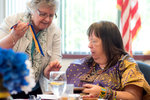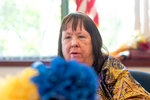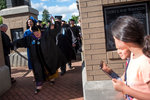



It is not a single accomplishment that made Alicia Wicks a prime candidate for the annual Distinguished Alumnus award at Centralia College.
Instead, it was the culmination of her life spent working hard and helping others.
She was presented with the award on Friday at a luncheon before speaking at the Centralia College commencement ceremony later in the afternoon.
“There are a lot of things that add up to distinguished alumni,” said Carrie Aadland, the person who nominated Wicks. “It is the sum of all her parts.”
When Wicks graduated from the college in 1964, she joined the Peace Corps and spent two years in Africa teaching English and African literature.
“With almost no skills or expertise, you can make a real difference,” Wicks said about volunteering in the Peace Corps.
After returning to the U.S., she earned a master’s degree in education from Eastern Oregon University and a law degree from Golden Gate University. She stayed in San Francisco for 15 years working as an attorney.
She returned to her hometown of Centralia when her father died. She adopted three children as a single parent and worked for the college administering the Individualized Certificate Program.
When Wicks retired in 2003, she helped former college president Hank Kirk and his wife Jenny at the University of Livingstonia in Malawi, Africa. She spent time in several other African nations teaching unmarried mothers how to sew to support themselves. She eventually found her way to Kenya to work with the traditional Maasai people.
She told the family she was living with, who were somewhat modernized compared to the rest of the tribe, “my heart wants to put down roots here.”
After that, they built her a home in the village, and she has been welcomed by the people. She has helped them get food they cannot grow, raise herd animals and help girls get their education to prevent them from becoming child brides. In one way or another, Wicks said, she supports around 200 people.
One moment that has always stood out to her is when she asked an 11-year-old girl why she wanted to get an education.
“Her answer was to have a chance at life,” Wicks said. “She understood the importance of education.”
In Maasai custom, if a girl’s family cannot pay for school she is to be married off, Wicks said. That usually occurs at the age of 13 or 14.
Wicks also helps members of the tribe support themselves by purchasing material for them to make traditional Maasai jewelry that she then sells in the United States to help fund her humanitarian efforts. Not only does she pay for the materials, she pays the people who make the jewelry an hourly wage, which is unusual for that part of the world, Wicks said.
“Alicia was always the more adventurous one of the two of us,” her brother Dr. Elliot Wicks said.
He was honored as the Centralia College distinguished alumni in 2004 for his work and expertise in the health care policy field.
“It is great that we got this award for completely different contributions,” he told The Chronicle.
Since 1964, Wicks has visited Africa five times. The longest stint was the first time in the Peace Corps for two years. Since then, the trips have ranged from two to nine months.
She plans on returning for as long as she can.
“To do exactly what you want to do is such a gift,” Wicks said.